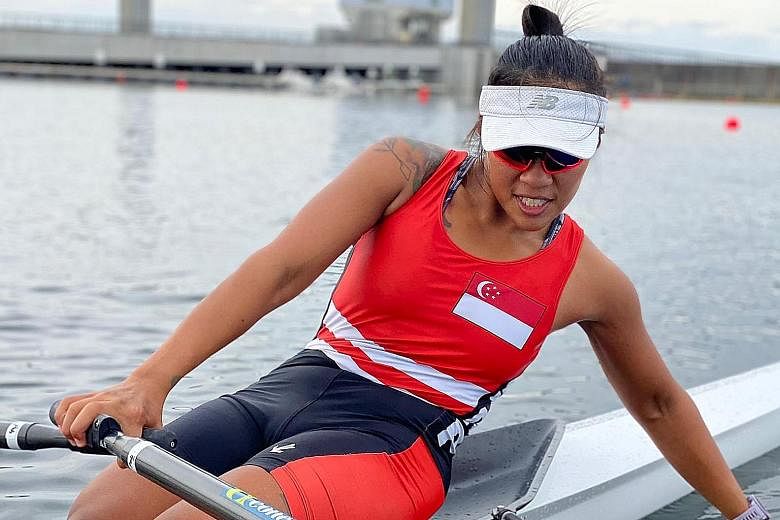Some time during the past year, rower Joan Poh realised that an overcast sky was the perfect analogy for how she felt about the uncertainty over the Olympics.
In Tokyo last Friday, she placed 12th in the women's single sculls at the Asia and Oceania qualification regatta, which represented the final opportunity for her to qualify. But she still does not know for sure if she has done well enough to return to Japan in two months for the Olympic Games.
Over the weekend, the 30-year-old has been performing mental gymnastics trying to work out the qualifying criteria to determine if she did. She thinks she has, but will only know for sure when the World Rowing Federation makes an official announcement by May 28.
The wait might be excruciating for some, but in a phone interview with The Straits Times yesterday, Poh said she is dealing with it just fine. She explained her weather analogy, which she came up with to explain to people she came across, like cabbies and private-hire drivers, who ask her what she does for a living and then "in the same breath" ask about the prospect of a cancelled Tokyo Olympics.
"I tell them it's like doing laundry," said Poh.
"You've washed all your clothes and taken them out of the washing machine. But suddenly, you look out and you're not sure if it's going to rain. How now? Do you keep your wet clothes inside?
"No. The logical thing is to hang them out to dry, and wait until the very last minute until the rain starts coming down, then you bring them in."
In the same vein, she intends to keep plugging away at her dream until "the plug is finally pulled" on it. Given everything she has put into it after it crystallised in her mind in 2018, she was never going to give it up easily anyway.
A CHALLENGING PATH
Poh's calloused hands will testify to the effort she has put in on her journey but she has also sacrificed time, money and career advancement.
From the start of 2019, she took 16 months of no-pay leave from her job as a staff nurse in Tan Tock Seng Hospital's renal department to train overseas, from Hong Kong to Greece, China, Canada and Australia.
The coronavirus pandemic saw her return to work in April last year, when she assisted dialysis patients, particularly those on peritoneal dialysis, a treatment for kidney failure.
She admitted that trying to maintain her training - at least 20 hours a week - while juggling eight-or 10-hour shifts at work was tough.
-
$30k
National rower Joan Poh's Olympic journey, which started in 2018, has cost between $20,000 and $30,000 a year.
"It's just the nature of the job that I won't get a fixed schedule which athletes live with," she said, recounting how she often missed meals on her first few days back at work.
"But I think this has helped me overall too, because I think I'm better now with dealing with unforeseen circumstances."
As sport began to resume with most of the world adjusting to a new normal, and with Olympic qualification back on the table, Poh in March again went on no-pay leave and returned to full-time training.
"I trained three times a day, up from two before, so I increased my training hours a bit more," she said.
"But the main difference was I was able to plan my recovery, nutrition and other errands around training again."
MANY HELPING HANDS
Poh notes that a big reason she finds herself on the brink of qualifying for the Olympics is the help she has received from supporters like the Pho3nix Foundation, which has sponsored her to the tune of €8,000 (S$12,900).
It is a non-profit organisation created by Polish businessman Sebastian Kulczyk, whose aim is to promote physical activity as a way to improve health and well-being with a particular focus on those in disadvantaged situations.
With her Olympic journey, which started in 2018, costing between $20,000 and $30,000 a year, Poh has relied on her savings for the most part.
She received support from SpexGlow funding - a government grant for loss of wages which offers financial assistance to national athletes, up to a maximum of $3,000 a month for up to 12 months - and raised about $5,000 through crowdfunding.
She also highlighted the effort of her coach, Laryssa Biesenthal, a former Canadian athlete and Olympic bronze medallist who has worked with her since August last year. They had met at the World Championships in Austria a year earlier.
Koh Yuhan, team manager of the Singapore contingent that competed at the Asia and Oceania qualifiers, said: "Coach Laryssa is one of the reasons Jo kept going.
"Many times in the past, coaches have told Jo she's too short (at 1.66m) or small to succeed in rowing, but Laryssa was the first to say, 'That's OK, we'll just find another way' for her to be successful. She has been very empowering."
Koh herself has played a big role in Poh's Olympic endeavour.
At the qualification event in Tokyo, she was a bridge between athlete and coach, cycling along the side of the Sea Forest Waterway as Poh trained and raced while filming the athlete, and sending the footage to Biesenthal.
She would also arrange calls with the coach right after Poh got off the water.
If it was too late owing to the 14-hour time difference between Japan and Canada, she would relay notes, pointers and game plans Biesenthal had come up with for the athlete.
Said Poh: "Yuhan's role as team manager is behind the scenes, just like so many of our support staff, who are all unsung heroes...
"This journey has been arduous but every time I fall short or it seems I don't have enough, people come on board to support me."
For Poh, the skies in her long struggle finally appear to be clearing up.


